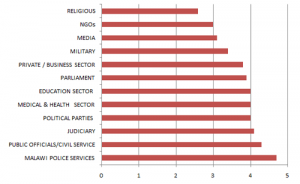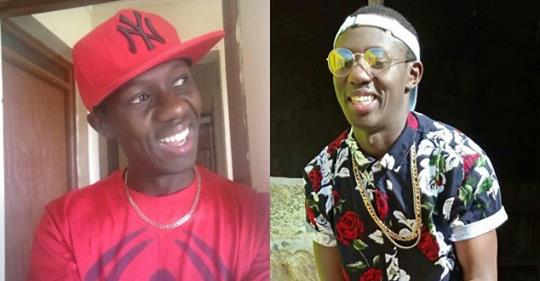MALAWI CORRUPTION: The Malawi Police Service is the most corrupt institution out of 12 others, according to the Global Corruption Barometer 2013 report by the Transparency International (TI).
Measured on the score scale of 1 to 5, where 1 means not at all corrupt while 5 means extremely corrupt, MPS has scored 4.7, followed by public officials and civil servants at 4.3 and the judiciary at 4.1.
Political parties, medical and health sector and education sector are the fourth most corrupt with each of them scoring 4.0.
Parliament is at 3.9, business and the private sector at 3.8, military at 3.4, the media at 3.1 and NGOs at 3.0. The least corrupt in Malawi are religious bodies at 2.6, according to the report.
An accompanying statement on the report notes that more than one person in two thinks corruption has worsened in the last two years.
But the survey participants also firmly believe they can make a difference and have the will to take action against graft.
The Global Corruption Barometer 2013 is a survey of 114,000 people in 107 countries and it shows corruption is widespread, considering that 27 per cent of respondents have paid a bribe when accessing public services and institutions in the last 12 months, revealing no improvement from previous surveys.
The statement says still, nearly 9 out of 10 people surveyed said they would act against corruption and two-thirds of those who were asked to pay a bribe had refused.
“Bribe paying levels remain very high worldwide, but people believe they have the power to stop corruption and the number of those willing to combat the abuse of power, secret dealings and bribery is significant,” the statement quotes Huguette Labelle, Chair of Transparency International.
According to the report, 36 countries view police as the most corrupt, and in those countries an average of 53 per cent of people had been asked to pay a bribe to the police.
Twenty countries view the judiciary as also among the most corrupt and in those countries an average of 30 per cent of the people who had come in contact with the judicial systems had been asked to pay a bribe.
“Governments need to take this cry against corruption from their citizenry seriously and respond with concrete action to elevate transparency and accountability,” Labelle said.
The barometer shows a crisis of trust in politics and real concern about the capacity of those institutions responsible for bringing criminals to justice.
In fifty-one countries around the world political parties are seen as the most corrupt institution. Fifty-five per cent of respondents think government is run by special interests.
“Politicians can lead by example by publishing asset declarations for themselves and their immediate family,” says the report.
It further says political parties and individual candidates, meanwhile, must disclose where they get their money from to make clear who funds them and to reveal potential conflicts of interest.
It urges government to ensure strong, independent and well-resourced institutions to prevent and redress corruption.
“Too many people are harmed when these core institutions and basic services are undermined by the scourge of corruption,” Labelle added.
Speaking in an interview, Tapiwa Uchizi Nyasulu, TI’s Regional Coordinator-Southern Africa in its African Department, said most surveyed Malawians admitted to have given a bribe or being asked to pay a bribe by police officers.
“Methodologically, we asked people to indicate if they had been in contact with police in the last 12 months and asked if they paid a bribe. People’s experiences show that they pay a bribe to police.
“In one way or another, it shows the fact that public officials are not doing much to fight corruption,” said Nyasalu.
She said corruption among the police services is not unique to Malawi, saying across the 17 other African countries surveyed, police comes out as the service to which citizens pay bribes the most.
“This finding is not new in our [report]. Almost every edition highlights the same situation, hence conversations we are having with some partners in the region regarding initiating some work to promote transparency, accountability and integrity in the police in the region,” said Nyasulu.
On the education sector, she said corruption persists in the sector where bribes and corruption range from students bribing authorities to leak exams, find a place at public universities and during procurement for education materials.
But reacting to the release, national police deputy spokesperson Kelvin Maigwa said not all police officers are corrupt.
“It’s difficult for us to comment as we are yet to see the report itself but suffice to say that while we accept that there are a few corrupt officers within police, we reject the notion that the whole service is corrupt.
“As a service, we are doing all we can to fight corruption and we encourage the public to report corruption by any officer to his superiors and again in the same vein, we are asking the members of the public to desist from enticing members of the service with bribes as in most cases it’s the public which entice police into corruption,” said Maigwa.





No comments! Be the first commenter?